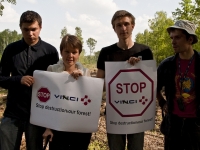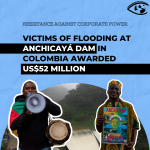Mystery Threats Dog Russian Activists Fighting Vinci Highway Joint Venture

A mysterious fire and a missing activist have contributed to the concerns of Russian activists fighting a new highway between Moscow and St. Petersburg. The highway is being built by a consortium that involves Vinci, a French company, and individuals rumored to be close to prime minister Vladimir Putin.
This past weekend, new automotive dump trucks and a hydraulic excavator were set on fire by unknown individuals, at a disputed site in the Khimki forest that the activists have been fighting to protect. Days later Pavel Shekhtman, who has been campaigning against the impact of the highway on the forest, temporarily disappeared from his flat. "Pavel managed to call a friend and tell him that his apartment was being searched. After that his phone was snatched out of his hand, and he no longer replied to any calls," fellow activist Yevgeniya Chirikova told Interfax news agency.
"The torching of the vehicles in the Khimki forest is a provocation aimed at smearing the Khimki forest campaigners who use only peaceful, legitimate and non-violent methods," Chirikova wrote on Twitter.
The 2,500 acre Khimki forest, just outside Moscow where the Czars of Russia once hunted, boasts 200-year-old oaks that the Washington Post described as "stand(ing) so thick and silent that traffic from the nearby highway sounds like the hum of a lazy mosquito, leaves fall to the ground with a veritable clatter." It was designated a "forest park" - which protected it from development under Russian law - until November 2009.
A few months prior, in July 2009, "Severo-Zapadnaya Concessionnaya Kompaniya" (North-West Concession Company (NWCC) was awarded an $8 billion contract to build a 700 kilometer (437 mile) highway. NWCC is a joint venture between Vinci - the largest construction company in Europe with over â¬28.5 billion ($37 billion) in orders last year - which owns half of the venture and a secretive group of investors.
An investigation by CEE Bankwatch, published in April 2011, revealed "a complex web of offshore entities ending in the British Virgin Islands, and confirms the involvement of Arkady Rotenberg "a friend of prime minister Putin. It noted that the entities were "mainly based in the tax privileged jurisdiction of Cyprus and partially end up in tax haven companies based in Tortola, British Virgin Islands, and (possibly) in Nassau, the Bahamas."
The NGO also noted that Igor Levitin, a former Russian minister of transport who is now a presidential advisor, was formerly deputy CEO of SeverstalTrans, one of the Russian partners. "Levitin is also a Chairman of the Board of Directors of the Sheremetyevo International Airport corporation," writes CEE Bankwatch. "A considerable part of the first section of the motorway coincides with the route of another project, the MRAR (Moscow Ring Auto Road)- Sheremetyevo-3 toll road, which would bring direct economic advantages for the airport company."
Violence has dogged the highway project. Mikhail Beketov, a local newspaper editor who supported the cause, was viciously beaten in November 2008 leaving him half paralyzed and unable to talk. Stanislav Markelov, his lawyer and a human rights activist, was shot and killed on a Moscow street in January 2009. In 2010 Khimki opposition activist Konstantin Fetisov had his skull fractured in an assault shortly after leaving a police station where he had been questioned about a protest. And Oleg Kashin, a reporter with the Kommersant newspaper, was savagely beaten with an iron bar and his fingers were smashed, after reporting on the project.
In August 2010 President Dmitry Medvedev called a temporary halt to construction pending an environmental review. An independent expert assessment published in February 2011 found that the planned routing was among the very worst among several alternative solutions.
A few months later, Pur Projet, a a French consultancy, was hired to advise on minimizing the environmental impact of the road.
Last month, Khimki activists traveled to Brussels to lobby the European Parliament to take action against the project. "This case is a powerful example of the need for a law banning European companies from involvement in corruption outside the EU," Satu Hassi, a green Member of the European Parliament and former Finnish environment minister who organized a hearing on the highway project, told The Moscow Times.
On July 20 the construction company made "a sudden attempt" to cut down an oak grove at the site. "In the morning, loggers with heavy machines started to cut down trees there (100-years-old oaks among them)" wrote the activists in a news flash, "Destruction of the forest was protected by few men with criminal appearance, presumably private security guards. Trees were also cut down near the mesotrophic bog - another piece of pristine wilderness heavily damaged by the project."
"They destroyed many, but it's far from destroying all. This time we were lucky enough to repel them," Sergey Ageev, one of the activists, tweeted. That night, a mysterious fire destroyed the construction equipment and soon after Shekhtman disappeared.
"(T)he official pre-text for this action was Pavel's participations in an anti-Putin rally on May 6 where our movement formed a "Green Column" demonstrate that Russian environmentalists oppose Putin's course in both economics and politics," an activist press release announced this morning. "Fortunately, he was ultimately released and returned to the Khimki Forest Camp."
- 183 Environment



